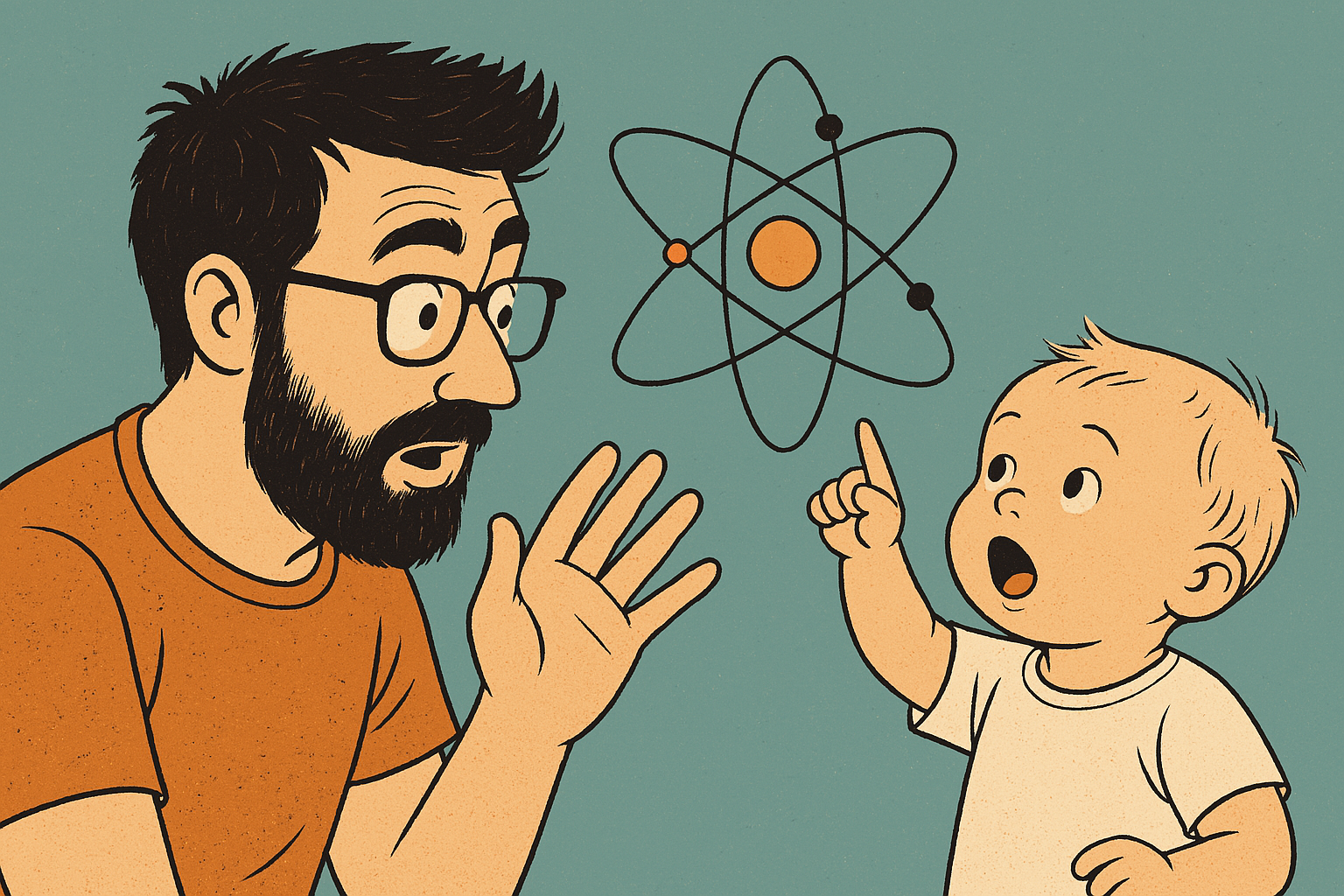I thought I was smart. I work in tech. I troubleshoot complex systems. I optimize databases. I write code that doesn’t crash on Fridays. But then I had a son.
And slowly, I began to realize something deeply humbling:
This tiny human — who still occasionally tries to eat my slipper — is doing things that would blow the minds of most adults I know. Including, at times, myself.
He Tasted the World — Literally
Babies have 30,000 taste buds. Not just on the tongue — all over the mouth. That’s three times more than adults.
When my son eats mashed banana, it’s not just a snack. It’s a multi-sensory fireworks display. Imagine if you could taste shapes, or feel sounds.
Some researchers believe that babies might experience synesthesia early on — a cross-wiring of the senses. That means he may literally taste textures or feel sounds before those brain connections settle down.
Honestly, it explains a lot. Including the deep betrayal he expressed after tasting broccoli.
He Saw Things I’ll Never See Again
At one point, my son could recognize every human face — no matter the ethnicity. Even monkeys. Yes, monkeys.
But then came perceptual narrowing: the brain’s way of optimizing for the environment. Like a smart algorithm that prunes unused inputs, his brain decided, “We’re not seeing a lot of lemurs around here. Let’s drop that subroutine.”
Now he’s laser-focused on familiar faces and sounds — namely, the ones he sees and hears at home in Italian and English.
For a brief time, though, he had global facial and phonetic superpowers.
And we call adults smart?
He Predicted Physics Before Sitting Up
At just four months, he understood something was about to touch him before it did. His brain linked vision and touch.
This is called peripersonal space awareness, and it means he’s already tracking where his body ends and the world begins. Not bad for someone who still poops in Morse code.
By eight months, babies expect sensory outcomes — and are surprised when they don’t happen. That’s physics prediction.
That’s if-then logic, built in.
And unlike ChatGPT, he didn’t need a neural net refresh to understand object permanence.
He Could Hear Every Language on Earth
Until recently, my son could distinguish all the speech sounds in every known language — including ones we don’t even speak.
Hindi? Yup. Zulu clicks? Definitely.
But as he tuned into our two native languages — Italian and English — he lost the ability to hear contrasts he no longer needed.
This is called phonetic narrowing. It’s like a language engine optimizing for local data.
Meanwhile, he now says “banana” like it’s a mission-critical API call. Repeated hourly.
His Legs Had the Code. His Muscles Didn’t.
There’s this old myth that babies lose the stepping reflex by 2 months. Not true.
What actually happens? Their legs get heavier with adorable fat, and the muscles can’t lift them anymore. The code is still running — the hardware just chokes.
In fact, one study showed that babies who “lost” the stepping reflex started doing it again… in water, where their legs were lighter.
So yes — my son had the walking software pre-installed, he was just waiting for the driver update.
He Knows If You’re a Good Person
Science shows that babies — around a year old — can distinguish between “helpful” and “mean” behavior.
They even prefer nice puppets over mean ones. Without being told.
That’s proto-moral reasoning. Meanwhile, I still second-guess whether I was rude in that Slack message 6 hours ago.
If my son throws a puff snack at you, just know: it’s not random. It’s social feedback.
He Does Math. The Impossible Kind.
If you show a baby a simple math “trick” — like 1 toy going behind a screen, then another, and when the screen lifts there’s still only 1 toy — they stare longer.
That’s because they know something’s off.
It’s called number sense.
No formulas, no calculator. Just raw violation detection.
It’s basically unit testing for logic — except done silently, with judgmental eye contact.
Babbling = Precompiled Language
When he babbles “ba ba ba,” he’s not just making noise.
He’s compiling syntax.
Studies show that even deaf babies exposed to sign language will babble with their hands. Repetitive, rhythmic gestures that look just like spoken babbling.
So language prep isn’t about mouths — it’s about brains. And the brain doesn’t care whether you speak with your tongue or your fingers.
He’s not learning language. He’s already running the beta release.
His Brain Is Basically DevOps on Steroids
Here’s what’s running during nap time:
- Neural pruning
- REM-driven memory consolidation
- Cortisol modulation
- Synaptic reorganization
- Night mode updates
Sleep isn’t passive — it’s maintenance.
It’s unsupervised machine learning, every night.
Which is why I guard nap time like a sysadmin guards uptime.
Final Thoughts
Every day, I write code. I optimize systems. I fix bugs.
But none of it — none of it — compares to what I see unfolding in this curious, gurgling, banana-obsessed small human.
He’s learning language with no tutorials. Predicting physics with no math. Judging your character before you say a word.
He’s not just smart.
He’s smarter than ChatGPT.
And when I ask him something…
He looks me in the eye…
…and says: “Banana.”
Which, honestly, is probably all the wisdom I need.
